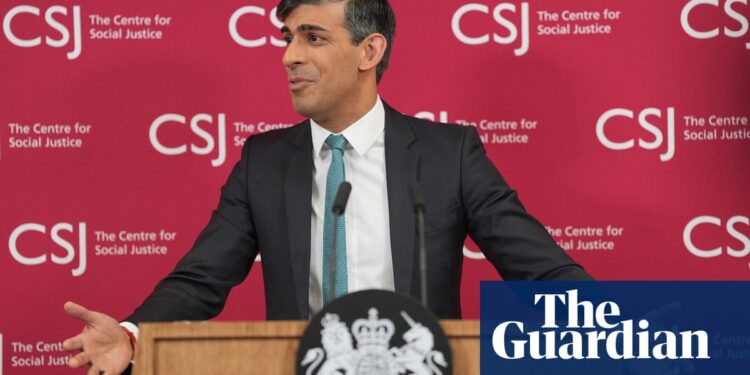Rishi Sunak has rejected an EU offer to strike a post-Brexit deal to allow young Britons to live, study or work in the bloc for up to four years.
The prime minister declined the European Commission’s surprise proposal of a youth mobility scheme for people aged between 18 and 30 on Friday, after Labour knocked back the suggestion on Thursday night, while noting that it would “seek to improve the UK’s working relationship with the EU within our red lines”.
The European Commission president, Ursula von der Leyen, suggested the scheme, which would also have allowed young people from within the EU to stay in the UK to work or study for the same period of time, would have been an area in which there could be “closer collaboration”.
“The topic of youth mobility is in both our interests, because the more we have youth mobility being on both sides of the Channel, the more we increase the probability we will be on good terms because the next generation knows each other very well,” she said on Thursday.
But the UK government indicated on Friday that Brexit had ended free movement and it had no desire to reopen that conversation, even with strict conditions on length of stay.
“We are not introducing an EU-wide youth mobility scheme – free movement within the EU was ended and there are no plans to introduce it,” a government spokesperson said.
However, they did note that the government would be happy to do deals with individual member states. It is known that the UK is keen to strike an arrangement with France.
One source said the UK wanted to “cherry-pick” which countries it wanted such programmes with.
The youth mobility scheme would not be a return to freedom of movement and would, if agreed, require a YMS visa, evidence of sufficient funds to sustain a living and health insurance.
The Conservatives have been urged to rethink their rejection of the offer because it could help boost the economy.
Ed Davey, the leader of the Liberal Democrats, said: “Expanding our existing youth mobility visas to cover European countries on a reciprocal basis would be a win-win.
“It would be a much needed boost to our economy, especially hospitality and tourism; it would offer great new opportunities to young British people to work abroad; and it would be a crucial step towards fixing our broken relationship with Europe.
“Of course, the details would need to be negotiated, but no UK government should reject this idea out of hand.”
Some Labour MPs believe the scheme could have helped Labour reach its plan to decarbonise UK power by 2030.
A senior Labour MP likened the scheme to a “sugar-rush, fast-fix” solution that would be helpful to an incoming Labour government but would be hard to wean off. They said: “Even though Labour has reduced its green objectives, it still wants to decarbonise the grid. There will be a time lag between training, recruitment and reskilling workers that would require an army of engineers for example to do that, and we’re currently far behind.
“To hit the ground running, this scheme offers us the opportunity to do that, but we would have to continue to fix labour market shortages.”
A Labour spokesperson said: “This is a proposal from the EU Commission to EU member states, not to the UK. It has come about because the UK government is reportedly approaching other European countries to try to establish mobility arrangements.
“Labour has no plans for a youth mobility scheme. We have already suggested some tangible ways that we would look to improve the relationship and deliver for British businesses and consumers, including seeking a veterinary agreement to tackle trade barriers, mutual recognition of professional qualifications and improved touring opportunities for artists.”
Anand Menon, a professor of European politics and foreign affairs at King’s College London and director of UK in a Changing Europe, said: “Clearly there is a debate to be had about the costs and the benefits of a youth mobility scheme, but I find it utterly depressing that both of the major political parties, one of which will form a government after the next election, do not know the difference between free movement and a limited youth mobility scheme which involves visas.”
He said he suspected the surprise emergence of a youth mobility scheme was a move to head off cherry-picking in the EU in the face of a surge of far-right parties, some of which are Eurosceptics.
“They are scared that member states will do bilateral deals, which becomes more of a threat the better the Eurosceptic parties do in the elections,” Menon said.
“For instance, Geert Wilders [the Dutch populist politician] would be more likely to do a bilateral deal with Britain if it involves annoying Brussels, and then the danger is you end up with governments in the EU negotiating unilaterally with the Brits because it is in their own interests.”
Source link : https://www.theguardian.com/politics/2024/apr/19/sunak-rejects-offer-of-mobility-scheme-for-young-people-between-eu-and-uk
Author :
Publish date : 2024-04-19 07:00:00
Copyright for syndicated content belongs to the linked Source.



